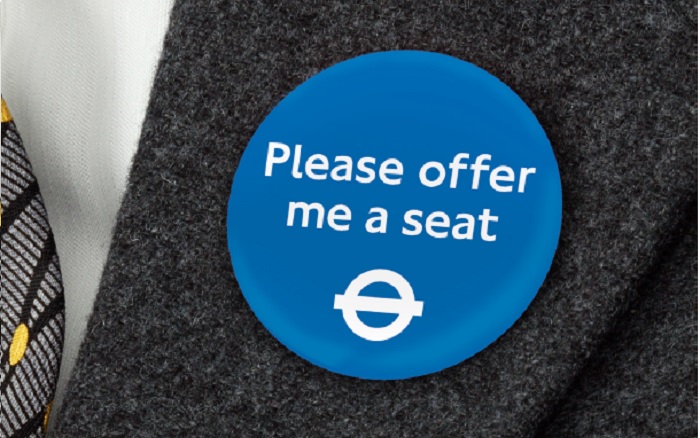London Unveils Badge Program for People With Invisible Disabilities
Update: On April 28, 2017, Transport for London (TfL) announced it is rolling out its badge program on a permanent basis. Those interested in receiving a badge can apply through the TfL website.
London’s transportation department wants to help people with invisible conditions find a seat on public transportation. Starting September 12, Transport for London (TfL) will spend six weeks testing a badge program for people with invisible illnesses and disabilities. The badges, which say “Please offer me a seat,” are designed for people who are unable to stand, but appear like they can. Those who see someone wearing a badge will then be encouraged – through campaigns and materials distributed by the TfL – to offer up their seat.
The TfL is currently recruiting 1,000 people for its trial program. Those receiving a badge will also get a card to present to transportation staff. According to the TfL website, if the trial is successful, more people will be able to apply for the program.
The new initiative was modeled after London’s “Baby on Board” program, which provides similar badges to pregnant women allowing them priority seating. The program has been widely successful with over 310,000 badges issued per year.

“We appreciate that asking for a seat on public transport can sometimes be difficult, particularly for customers who have hidden disabilities or conditions. That is why we are launching this trial,” Mike Brown, London’s Transport Commissioner, said in a statement published by the TfL. “If it is successful we will work closely with older and disabled people’s organizations to develop the final product. I hope that Londoners help make the trial a success and offer their seat to someone with one of the badges or cards who may be in need.’
“When I was undergoing radiotherapy for throat cancer, it meant I couldn’t talk to ask for a seat and the morphine I was taking made me appear drunk,” Londoner James McNaught told the TfL. Before the TfL’s badge program, McNaught would wear a homemade “Cancer on Board” badge.
“It was a real struggle to get people to understand why I needed to sit down. I’m really pleased TfL is doing this trial. A badge and card could help make a real difference to the lives of people undergoing drug treatment or with longer term conditions or disabilities.”
Those interested in participating can email the research agency working with TfL for more information.
We want to know, would you wear a badge to alert people of an invisible illness or disability? Let us know in the comments below.

